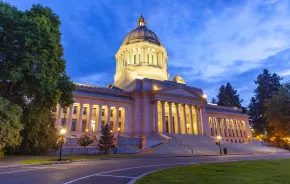
Editor's note: This article has not yet been updated for 2016. Check back.
For some kids, horses are the main reason to go to camp. But as parents ponder summer camp choices, adding horses to the mix introduces a whole new level of inquiry. What do novice parents and riders need to know before they sign up for an equestrian camp?
We asked experts and parents of horse-loving kids for pointers on how to choose a horse-riding camp in the Northwest. Along the way, we found out why families are thankful for the lessons learned from time spent with equine friends.
Teenager Sophie Wilsdon, who now owns her own horse, shares what she's gained from horse camp: Over the years, she says, “I’ve learned about deadlines and responsibility, how to treat animals and people with respect, and that hard work pays off.”
Read on for our primer on why and where to choose a Seattle-area horse camp.
Part 1: 8 tips for picking a great horse camp
Part 2: Great Seattle-area horse camps to consider
Part 1: 8 Tips for Picking a Great Horse Camp

1. Make sure the instructors are experienced.
“How many years have they been in business? The horse world is rife with people who say, 'Oh, I have been riding for a long time. I can teach people how to ride horses,'” says Jim Hutchins, the president and director of education at the NW Natural Horsemanship Center. "It’s important to find a place where the main instructors are over the age of 18, they have insurance, and they have some experience teaching; Obviously, the more experience, the better.”
Christina Wilsdon, author of the book For Horse-Crazy Girls Only: Everything You Want to Know about Horses and mother to a teenage daughter who has been smitten with horses since she was small, suggests finding out if the instructors are certified by an organization such as the Certified Horsemanship Association (CHA).
2. Volunteer teens add to the camp experience.

Wilsdon says it’s great if teens or tweens work as volunteer helpers. “Younger kids really look up to these volunteers, and can look forward to training as volunteers themselves if they remain interested in horsemanship,” she explains.
3. Kids should learn about horses on the ground first.
How to “be” in a horse's presence is vital understanding for beginning riders, says Hutchins. “Our focus is on more full understanding of a horse. You don’t come to our place to hop up on a horse and start riding. You first have to understand the language of the horse, how to be a leader for the horse, and how to understand lightness, which is the way you use light energy and pressure to guide a horse."
4. Horses 101 should be part of camp.

A reputable camp teaches children about how to behave around horses on the ground and skills such as leading, grooming , and tacking and untacking (saddling), says author Wilsdon. “Ideally they'll also have some class time during which they teach kids about horse psychology and behavior, horse anatomy, and such.”
5. Research horse camps online but visit them in person
With the web at their fingertip, parents can easily “see” camps online for a cursory review of the facilities. Still, take a close look during pre-camp visiting days and when you drop your child off. “Are fences sturdy? Is it tidy? A barn's a barn, of course, but it shouldn't be a sty! It should smell pleasantly of hay and horse and not like a super-sized version of a litter box,” says Wilsdon. “It should look well cared for, and the horses and ponies should be friendly, curious and contented. Older animals are fine, so you might not see lively, alert and energetic [horses] on display — but the horses and ponies should definitely appear well cared for.”
6. Find a camp with an activity balance that works for your child
Understand what you want as a parent from the camp experience and what your child wants. "Does your child want to learn about horses, how to care for them, how to ride them, or does she just want a pony ride?” says Julianne Bishop, mom of a girl who loves horses. “Look at the training of the instructors and what the program is trying to convey to the camper. A lot of camps sell horse experiences, but that may mean riding a horse on a lead around a ring. Other camps teach horsemanship: How to care for a horse, how to tack a horse and how to actually ride the horse. It’s a big difference.”
Teenager Katy Witeck has attended Camp Sealth’s horse camps and appreciates that the camp includes non-horse activities as well. “Camp Sealth isn’t all horses. Every day you get to do a new thing like archery, paddle boarding or a nice long hike. Of course you get to ride horses every day, and learn something about them every day, but you have a lot of options to choose from with your group,” she says.
7. Camps should emphasize safety

Helmets are a must. “The camp rules should insist that children wear helmets when riding and when working around horses. These helmets must be horseback-riding helmets that are properly certified. If any camp tells you that it's okay for a kid to ride wearing a bicycle helmet or any other type of helmet, run away, run away!” says Christina Wilsdon.
Wilson notes that a CHA-certified instructor has described how a bicycle helmet's design could actually make a fall from a horse more, not less, dangerous. Campers should be able to bring their own riding helmets, and camps should have a variety of helmets for kids to use at camp and staff will help kids find one that fits properly.
8. Note the benefits of horse camps for children
Horse camp can bring many rewards beyond horse handling and riding experience, say experts. Wilsdon says in addition to horse handling skills, her daughter has learned skills like how to work with a wide variety of people, the relevance of science to everyday life, respect for and understanding of another species, responsibility and organization, and consequences of actions. “Being horse-crazy has given her an interest that has sustained her during the turbulent years of adolescence.”
NEXT: 14 GREAT PACIFIC NORTHWEST HORSE CAMPS TO CONSIDER
BACK TO: INTRODUCTION
Great Seattle-area horse camps
Note: This is a selection of camps that come highly recommended by parents and experts. We couldn't hope to cover all the terrific horse camps in Western Washington; find more in ParentMap's Directory.
Horse camps on the Eastside
The Farrel-McWhirter Riding School (Redmond, Wash.)
Camp basics: Summer riding camps for ages 3 to 12 years. Parents can watch lessons anytime. The City of Redmond’s Adaptive Recreation Department offers inclusion services for kids with special needs.
Day or overnight camp: Day camp; three hours per day.
Horse facts: Campers ages 5–12 have a horse assigned to them for the week (if possible); 3- to 5-year-old campers divide the riding time with a partner. Camp time is evenly split between horsemanship and craft and education time, which is all equine- or farm-related.
Price range: Equestrian camps for ages 5–12-year-olds are Monday through Thursday and are $360R/$432NR. My Little Pony Camps (ages 3–5) are arranged in two-day ($120R/$144NR) and three-day ($180R/$215NR) programs. (Note: Prices not updated for 2015 yet.)
What makes it different: The school strives to make horseback riding accessible to everyone by serving children with special needs, breaking groups into appropriate riding levels, and with prices that are lower than many other horse camp options.
Overlake Farms (Bellevue, Wash.)
Camp basics: Overlake Farm offers beginning riding and farm camps for 5–12-year-olds. Activities include horseback riding, archery, dutch-oven cooking, tipi/log-cabin building, plant identification, stream/pond exploring, hiking, old-world crafts and caring for farm animals. The camp can accommodate some special needs.
Day or overnight camp: Day camp.
Horse facts: Campers work with their own assigned horse for the week. Camp runs from 9 a.m. to 3 p.m., with 45 minutes of horse time.
Price range: $200 for farm camps and $400 for horse camps (horse camps already full for 2015!)
What makes it different: This camp isn’t just about horse-riding, with campers enjoying all the animals at the farm and exploring the farm and its wild surroundings.

Rockmeadow Equestrian Center (Sammamish, Wash.)
Camp basics: Located on a 38-acre working horse farm and opened in 1986, Rockmeadow introduces kids to all aspects of beginner horsemanship, including safe handling, grooming, daily care of the horses and riding. The camp also offers arts and crafts, gardening, nature walks and special events such as a camper's horse show and riding demonstration.
Day or overnight camp: Day
Horse facts: Kids are assigned a horse or pony to care for during camp. They learn horse care and handling, as well as English-style riding for three hours each day.
Price range: $675 a week for full-week camps (Monday–Friday, 9 a.m.–3 p.m.); $425 for three-day Mini Camps (Monday–Wednesday, 9 a.m.–3 p.m.).
What makes it different: Rockmeadow's camps only have 10 campers per session, meaning lots of one-on-one attention for kids. RockMeadow is also a program member of the Certified Horsemanship Association (CHA) and the camp director, Deborah Ritchie, has attained the highest level of certification awarded by the American Riding Instructors Association.
Hollywood Hills Equestrian Center (Woodinville, Wash.)
Camp basics: Camps are for ages 7–18 and are grouped by ability and age. There are camps for kids who want to become CHA-certified. Riders can choose riding instruction in either Western or English style. There is a final-day horse show for parents.
Day or overnight camp: Day camp, from 9 a.m.–4 p.m.
Horse facts: Each child has a horse to groom and lead but they might share a riding horse. All activities are horse-related.
Price range: $500 for the week. There are also three-day camps and mini-day camps with pricing dependent on the number of campers and activities.
What makes it different: The woman who runs HHEC has impeccable safety standards and each camper progresses at his or her own pace with horse riding.
Girl Scouts of Western Washington Horse Camps (Allyn, Wash. and Carnation, Wash.)
Camp basics: Camps are overnight, and vary in length. Only the 6-day and 13-day camps are eligible for a trail ride. You can be in any grade and be a beginner. Another option: A girl in second or third grade in classic camp has the option to have a one-time, two-hour horse experience. The camp is special-needs friendly.
Day or overnight camp: Overnight camp
Horse Facts: Each girl has a riding assessment to match her up with the right horse and to determine experience level. They have 15 horses, so girls share the horses and have two hours each day with the horses — one hour for ground lessons (care for the horses, anatomy, etc.) and one hour for an arena riding lesson.
Price range: Price depends on the program and length of session the camper is attending. Three-day camp costs from $335-$485; rates increase from there.
What makes it different: The focus here is on girls feeling capable of caring for their horses by week’s end, and the wranglers work closely with each camper.
NW Natural Horsemanship Center (Fall City, Wash.)
Camp basics: Camps for children ages 5 to 16 at any skill level with focused time with horses and creative time in art, which is taught by a professional art teacher. There is a skill show for the parents. The camps can accommodate any minor emotional, attention-deficit or physical challenge.
Day or overnight camp: Day camp.
Horse facts: Each child has his or her own horse to use. Children spend half their time with the horses and half in art class.
Price range: $250 for half-day camp; $500 for full-day camp; discounts for multiple camps and for eaerly-bird registration.
What makes it different: This camp splits its time between horses and art, and the creative time reinforces lessons learned with the horses.
Horse camps south and west of Seattle
Camp Sealth (Vashon Island, Wash.)
 Camp basics: Camp Sealth offers seven one-week sessions of horse camp, and teaches Western riding with beginner, intermediate and advanced programs. Age ranges vary by session, but are generally open to grades 4–11, and can accommodate campers with mild to moderate disabilities, too. Riding instruction includes arena lessons, ground lessons and trail rides.
Camp basics: Camp Sealth offers seven one-week sessions of horse camp, and teaches Western riding with beginner, intermediate and advanced programs. Age ranges vary by session, but are generally open to grades 4–11, and can accommodate campers with mild to moderate disabilities, too. Riding instruction includes arena lessons, ground lessons and trail rides.
Day or overnight camp: Overnight camp.
Horse facts: Each cabin group rides for two hours daily with 1 to 2 hours more for grooming, feeding, ground lessons or chores. Each camper is assigned a horse for the week. Horse time takes up about 50 percent of the total activity time each day.
Price range: Short week (5-day session) starts at $695 and increases from there.
What makes it different: Kids and parents love this horse camp because it offers a balance of horseback riding and other camp activities. Kids get a chance to develop a personal relationship with their horse and learn and grow together throughout the week. They also get a chance to experience the whole horse-care experience, including feeding, chores, grooming and ground lessons. Camp Sealth is located in a beautiful setting, with miles of riding trails through the woods and on the beach.
Nature Nurtures Farm (Olympia, Wash.)
 Camp basics: Horse campers age 7–12 learn about horse care, horsemanship and riding basics with lessons, bareback riding and trail riding. Camp staff members do their best to accommodate all children's needs.
Camp basics: Horse campers age 7–12 learn about horse care, horsemanship and riding basics with lessons, bareback riding and trail riding. Camp staff members do their best to accommodate all children's needs.
Day or overnight camp: Day camp.
Horse Facts: Campers share horses; the herd is comprised of ten rescued horses. Almost all camp activities are horse-focused. Non-horse activities may include interacting with the farm’s rescued animals, hiking and playing games.
Price Range: Horse camps range from $350 weekly for introductory horse camp to $425 for horse camp for more experienced riders.
What makes it different: In addition to horse activities, campers spend unstructured time playing at this outdoor farm. Camp counselors emphasize social and emotional skill building with peers and animals.
Red Gate Farm Day Camp (Samammish, Wash.)
Camp basics: Serves kids ages 6–12. Campers learn the basic positions for riding English at the walk and trot, how to start and stop your horse and how to turn. Skills focus adjusted for more experienced riders. There is a skill show for the parents.
Day or overnight camp: Day camp.
Horse Facts: Two kids share one horse for the week. Campers are around the horses for three to four hours per day, grooming, getting the horse ready to ride, riding and putting the horse away. When they’re not with the horses, campers are doing horse-related arts and crafts, learning about horses and playing educational horse-themed games.
Price range: $625 a week (ask about early sign-up discount).
What makes it different: This camp is all about horses, and campers learn to ride in the English style.
Camp Berachah (Auburn, Wash.)
Camp basics: Camp Berachah is a Christian camp that offers a wide range of horse-camp experiences for kids ages 8 to 14, from day camps to wrangler-in-training options. Camps also include non-horse activities such as swimming, canoeing, climbing wall, archery and fireside devotionals. There is an end-of-week horse show/game day for parents. New for 2015, there is also a horse teen camp for ages 12–17.
Day or overnight camp: Day and overnight camps.
Horse facts: Campers typically ride the same horse each day for their lesson time. Horses are used at other times for other campers for lesson time and trail rides; three horse hours on average. Other activities include: Crafts, swimming, rock wall climbing, archery, target range, zip-line and daily devotionals.
Price range: Overnight equestrian camps $359/$344 before April 15; trail-emphasis overnight equestrian camps $359/$344 before April 15; equestrian day camp $224/$214 before April 15; wrangler-In-training (WIT) $129/$125 before April 15.
What makes it different: This Christian camp has hosted camps for more than 35 years. Camps fill up quickly, and are associated with the Certified Horsemanship Association.
Horse camps north of Seattle
The Lang Horse and Pony Farm (Mount Vernon, Wash.)
Camp basics: Lang’s offers camps for kids of all ages, with more than 50 different sessions (and a Ladies' Weekend Camp!). No experience is required, and there are special programs for advanced riders. Most camps include a riding show for riders' parents on the last day of camp.
Day or overnight camp: Day and overnight camps.
Horse facts: Each child has a horse assigned to them for the week, and camp is all about horses.
Price range: $130 for a four-day Mommy and Me program, up to $1,650 for a two-week overnight camp. (Prices note updated for 2015.)
What makes it different: This camp has an extensive trail system. Its large number of horses (90) helps match up campers with just the right horse.
Warm Beach Camp (Stanwood, Wash.)
Camp basics: This camp focuses primarily on Western riding, with some emphasis in later levels on English. Warm Beach is a Christian camp with nightly chapel time. There is an end-of-camp show for parents. There is also a separate special-needs camp that involves horseback riding with side-walkers.
Day or overnight camp: Overnight camp.
Horse facts: Campers are given their own horse for the week. Nearly six hours a day are spent with horses and horse-related activities. Campers can also spend time swimming, playing miniature golf and completing a ropes course.
Price range: Price is $598 for a camp that starts Sunday late afternoon through the following Saturday morning. There are also parent-child weekend camps you can do.
What makes it different: These are small horse camps and the campers really become familiar with their horse.
Hidden Valley Camp (Granite Falls, Wash.)
Camp basics: Founded in 1947, Hidden Valley is a co-ed sleepaway youth summer camp for children ages 5-17. Campers live in small groups of 7 with their counselors and each camper helps to plan and participate in a wide variety of activities including hiking, horseback riding, swimming, sailing an canoeing, sports and arts and crafts.
Day or overnight camp: Overnight
Horse facts: Program facilities include a large corral with covered stalls for 20 saddle horses. All tent groups take riding lessons, go for trail rides and learn skills of horsemanship. Campers with a special interest in horses can also participate in Trailriders, an opportunity to come down the to the Corral during their free time to help out, groom horses, and learn about horse care.
Price range: Prices start at $1,330 for a 13-day camp.
What makes it different: Through its small-group emphasis, Hidden Valley aims to help campers expand their physical and social skills, self-esteem, independence, ability to live in a group, sense of responsibility and relationship building skills. Beyond the horse program, camp facilities include a sports field, a pond, waterfront activities such as kayaking, canoeing, boating, fishing and beach play, an archery range, tennis court, volleyball and badminton areas.
Horse camps further afield
Ekone Ranch (Goldendale, Wash.)
Camp basics: Since 1986, Ekone Ranch horse camps have emphasized natural horsemanship, nature-based activities and positive peer relationships. There is a riding demonstration at the end of camp. Ekone is also able to accommodate some special-needs campers.
Day or overnight camp: Overnight camp.
Horse facts: Campers typically spend 3–4 hours daily with the horses. Other activities include craft projects, naturalist hikes, nature-based games, swimming in the pond, gardening, cooking and other ranch projects.
Price range: Prices vary, with discounts for early registration and multiple sessions. Scholarships are also available.
What makes it different: This is a “working ranch,” and campers put hay in the barn, gather firewood, take care of the animals, and wash the dishes. In the riding arena, campers ride mostly bareback and develop strong bonds with the horses.
See also:
15 camps for kids with special-needs, which lists Little Bit Therapeutic Riding Center.
ParentMap's directory of riding camps
ParentMap Camps & Classes: Great Camps, Camps Calendar, Tips, Preview Events, and More...

















